April 17, 2025 | 22:58 GMT +7
April 17, 2025 | 22:58 GMT +7
Hotline: 0913.378.918
April 17, 2025 | 22:58 GMT +7
Hotline: 0913.378.918
Smallholder rubber farmers play an important role in Vietnam's rubber industry. Most notably, many Vietnamese businesses are supporting smallholder rubber plantations to obtain certificates of sustainable forest management.
Since the end of November 2022, Hoa Phat Forestry Joint Stock Company has provided assistance for 2,993.5 hectares of rubber plantations across 121 households in Minh Lap and Minh Thang communes, Chon Thanh district, Binh Phuoc province. These rubber plantations were granted the VFCS/PEFC certificate of sustainable forest management. They are also the first smallholder rubber plantations in Vietnam to be certified for sustainable forest management.
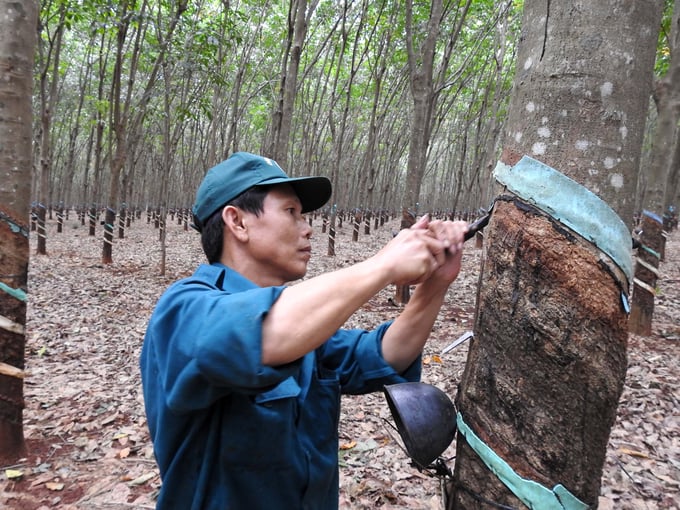
Rubber latex harvesting. Photo: Son Trang.
Ms. Nguyen Thi Thuong, General Director of Hoa Phat Forestry Joint Stock Company, said: “The company is pleased to assist farmers in the sustainable management of rubber plantations. Hopefully, the VFCS/PEFC certificate will open up new opportunities for Vietnamese smallholder farmers to sell their rubber latex products to meticulous markets around the world, including the United States, Europe, and Japan. The company will continue to accompany smallholder farmers in expanding the VFCS/PEFC-certified area in the immediate future”.
Subsequently, Chon Thanh became the first district in Vietnam to have a smallholder rubber plantation granted the VFCS/PEFC certificate of sustainable forest management. A report from Binh Phuoc Department of Industry and Trade shows that rubber trees account for 60% of the district's total natural area. Although the local rubber area is gradually shrinking, Chon Thanh aims to obtain the VFCS/PEFC certificate for at least 14.5% of the local rubber land. This plan will help the district's rubber latex products reach international markets in a more sustainable way.
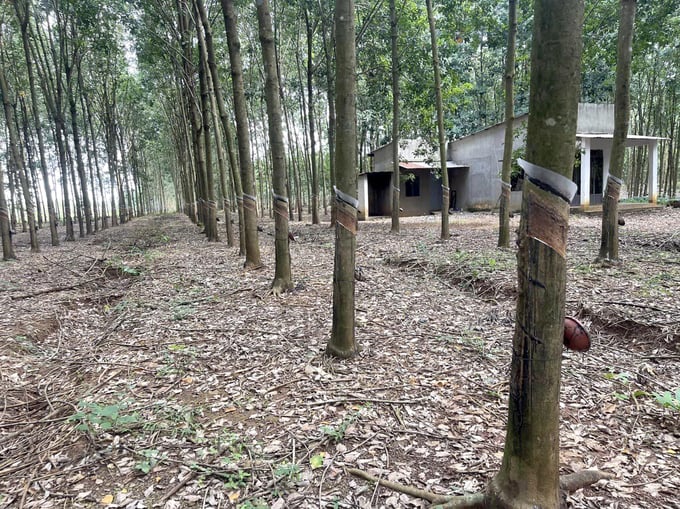
A smallholder rubber plantation in Chon Thanh, Binh Phuoc. Photo: Hong Thuy.
According to the Vietnam Rubber Association, smallholder rubber farmers play a very important role in Vietnam's rubber industry. It is estimated that there are 477,000 hectares of smallholder rubber plantations across the country, accounting for over 50% of the total rubber area. Smallholder rubber farmers provided more than 732,000 tons of rubber latex in 2019, accounting for 62% of the total amount of rubber latex in the country. Additionally, many smallholder rubber plantations have provided rubber tree wood for export processing factories. Smallholder rubber farmers have reportedly supplied over 1.7 million cubic meters of wood, accounting for 36.2% of the total amount of wood that Vietnam's rubber industry supplies to wood processing factories.
With a focus on export, Vietnam's rubber industry engaged extensively in the global market. The amount of natural rubber and rubber wood consumed domestically is considerably lower compared to that of the export volume. Export items must adhere to import markets' regulations in order to be integrated into the global market. Most importantly, export products must meet the requirements of legal products.
The report on "Vietnam's rubber industry supply chain: key features and roles of smallholder rubber farmers" showed that smallholder rubber households are a crucial part of the current rubber supply chain. As a result, smallholder rubber farmers must become key participants in the significant shift towards legal and sustainable products.
The requirements for certification, namely FSC certification, exceed the current capacity and management level of Vietnamese smallholders. However, with the future market trend of sustainable products, it is important to equip smallholder farmers with basic knowledge regarding sustainable rubber production. Most notably, strong linkage between businesses and smallholder rubber households is an important and effective solution to help households obtain VFCS/PEFC certificates, similar to the model supported by Hoa Phat Forestry Joint Stock Company in Chon Thanh.
According to the Office of Sustainable Forest Certification, the export turnover of natural rubber from Vietnam reached nearly USD 3.3 billion in 2022, the export turnover of rubber products reached USD 3.7 billion. On the other hand, the amount of rubber wood harvested annually provides approximately 10.7% of the wood used in the country for export processing.
The global demand for latex and rubber wood is slowly transforming, with an emphasis on the strengthening of regulations regarding the legality and sustainability of wood and rubber latex. Consequently, the development of sustainable rubber plantations plays an important role in the sustainable development of the forestry industry, ensuring that Vietnamese timber and rubber latex can gain access to high demand markets around the globe.
Translated by Nguyen Hai Long
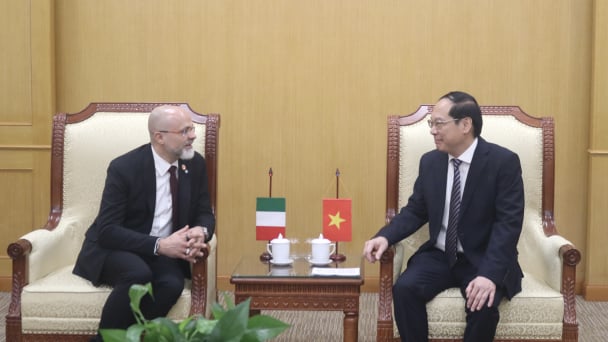
(VAN) During the working session with Deputy Minister Le Cong Thanh, Professor Francesco Corvaro, Italian Climate Change Envoy, reaffirmed Italy's commitment to supporting Vietnam in climate change response.
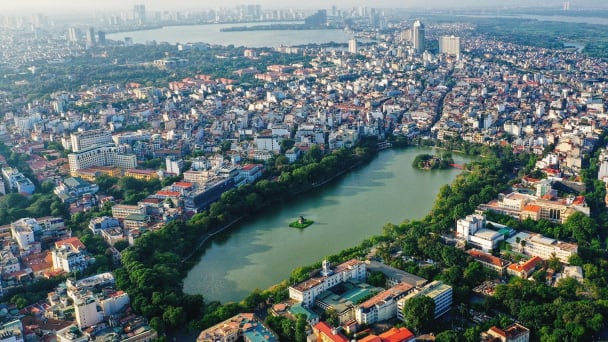
(VAN) After the merger, key leadership personnel of the provinces must consult with the General Secretary, key leaders, and the Standing Secretariat.
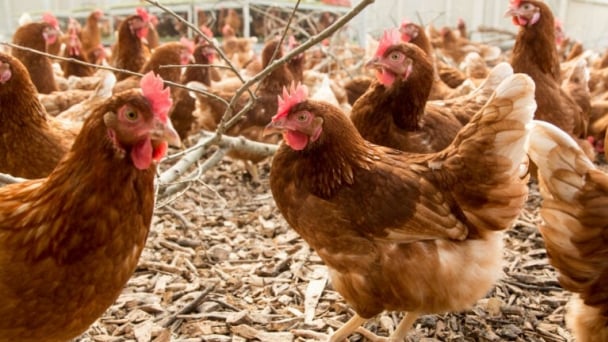
(VAN) The latest Business Benchmark on Farm Animal Welfare (BBFAW) reveals steady progress on farm animal welfare across the global food industry.
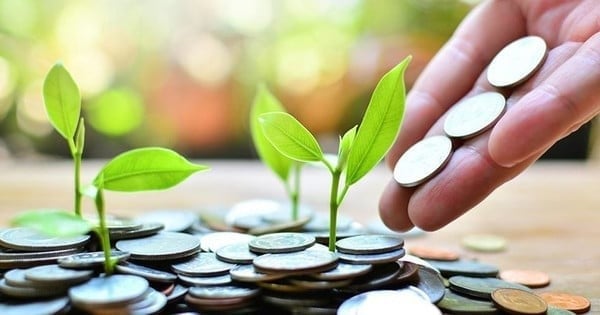
(VAN) Green credit is a financial policy that effectively supports environmentally friendly projects and activities today.
/2025/04/09/1049-2-165919_630.jpg)
(VAN) With a revenue of less than VND 30 billion/year, packaging producers are exempted from EPR liability under Decree No. 05/2025 newly issued.
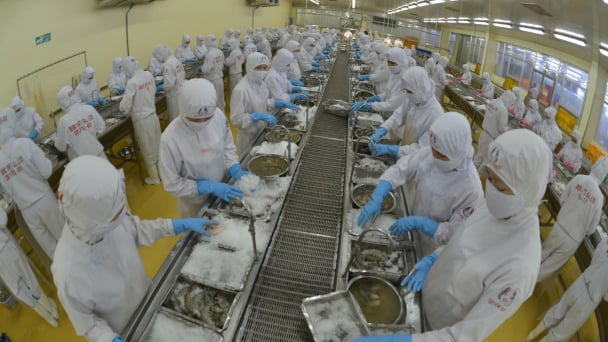
(VAN) Ministry of Agriculture and Environment has issued an Action Plan for sector's development in the coming period, aiming for a growth rate of 4% or higher and an export turnover of USD 65 billion.
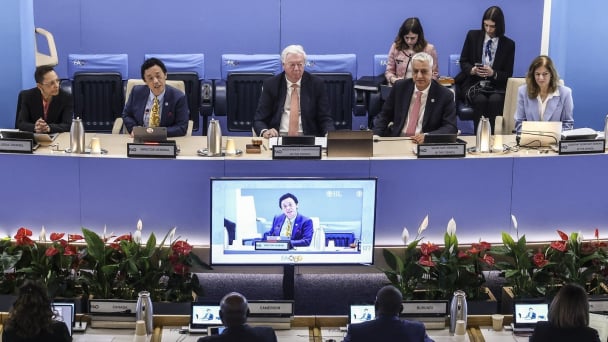
(VAN) The 177th Session of the FAO Council opened on Monday at the Organization’s headquarters in Rome.